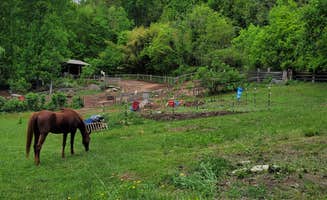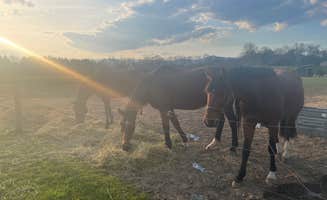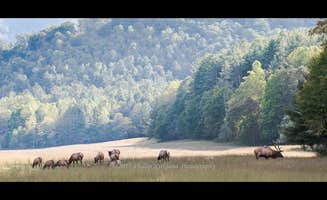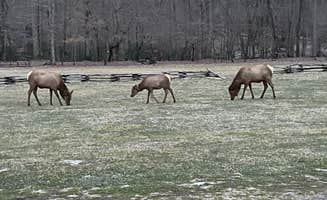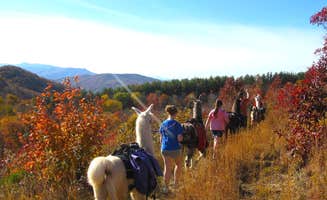Pisgah National Forest offers multiple equestrian camping options within a 30-mile radius of Asheville, North Carolina. The area features a network of horse trails accessible from designated camping areas designed specifically for riders and their animals. Horse campgrounds near Asheville, North Carolina typically include primitive facilities with designated parking for trailers and access to bridle paths that connect to larger trail systems.
What to do
Explore waterfalls: Several campgrounds provide access to scenic waterfalls within short hiking or riding distance. Near Lazy J Campground, "Three Falls waterfall is just up the road. You can get tubes at the office" notes camper Tracy S. The campground sits along the North Fork French Broad River, making it a convenient base for water activities.
Fish mountain streams: The rivers and streams surrounding equestrian camps offer excellent fishing opportunities. At North Mills River Campground, one camper explains, "We've enjoyed this campground mainly for the fly-fishing. The local Trout Unlimited group has also spent many hours upgrading the walkways and fence lines to protect the river." Another visitor confirms, "This is a great campsite if you like fishing! We stayed here and were close to some amazing spots to fish!"
Hike to mountain summits: The region provides trail access to significant peaks. Black Mountain Campground serves as a gateway to Mount Mitchell, as described by visitor David M.: "From here you can climb 4000ft to the summit of Mt Mitchell. It's a great, challenging hike with many rewards along the way."
What campers like
River access: Many equestrian campgrounds feature water access that campers particularly appreciate. At Mills River Dispersed, Tavi C. notes, "Gorgeous lush forest with ice-cold flowing stream (in May) immediately off most camp spots and well maintained and leveled places to pitch a tent." This offers natural cooling during warmer months.
Quiet seclusion: Remote locations provide peaceful camping experiences away from typical tourist areas. Visitor Max O. describes Wash Creek Horse Camp as "a bit of a drive through the forest to get here, but great spots if you're looking to get away from civilization." The site offers both community campground options and individual sites along the river.
Wildlife viewing: Several campgrounds provide opportunities to observe animals in their natural habitat. Cataloochee Campground offers exceptional elk viewing, with Jodie K. reporting: "We spent 5 nights and watched them early am and afternoons every day. They will get up close-and-personal. The rangers keep a watch out, tho, and try to warn u if they are coming too close."
What you should know
Road conditions: Access roads to horse camps often require careful navigation. For Upper Cove Creek dispersed sites, camper Angela M. advises, "Remote - you have to want to get up here but it's really easy to do once you drive it a few times." Similarly, at Cataloochee, visitors must traverse "a long 13 miles into the valley down a very narrow, curvy gravel road."
Limited amenities: Most equestrian campgrounds offer basic facilities. At Paradise Ridge Permaculture, camper Taylor explains, "There was a shared gazebo, cozy fire pit, and cold showers. The only downside was that there wasn't a secluded spot available for car camping." Visitors should prepare for rustic conditions.
Cell service limitations: Many forest campgrounds have minimal or no connectivity. Regarding Mills River, Tavi notes, "No cell service (Verizon) without driving 10 minutes, and then patchy for another 10-15." This isolation requires advance planning for safety and communication needs.
Tips for camping with families
Look for stream access: Children particularly enjoy water features at campgrounds. At North Mills River, Amanda reports, "We were the only campers there. It was very quiet. The stream ran right by the campsite so listening to the stream as we went to bed was wonderful."
Choose campgrounds with play areas: Some locations offer designated recreation spaces. The Lazy J Campground includes "a playground which is cool and the staff is very friendly," according to Tony E., making it suitable for families with younger children.
Visit historic structures: Several camping areas include educational opportunities through preserved buildings. At Cataloochee Campground, Myron C. notes, "There are several historic structures in the area--a school, a church, barns, old houses, etc." These provide learning experiences for children during camping trips.
Tips from RVers
Size restrictions apply: Many horse campgrounds have limited access for larger vehicles. At Black Mountain Campground, camper Scott K. advises, "There are no bad campsites, but if you wish to 'feel' the camp, get one on the river." However, access roads may limit RV size, with some campgrounds recommending against vehicles longer than 25-32 feet.
Check hook-up availability: Utility options vary significantly between sites. Camper Ricky J. notes that at Lazy J Campground, "We did a spontaneous trip to the mountains and we found this nice camp site along the North Fork French Broad River and we camped right along the river. It felt like we were camping deep in the woods." The site offers water and electric access while maintaining a forest feel.
Reserve early for river sites: Premium RV spots with water views book quickly. The North Mills River area has "a section to the right of the road for hook-ups. Across the bridge there are more spots for tents and campers," according to Shannon K., with riverside locations being most desirable during peak seasons.


